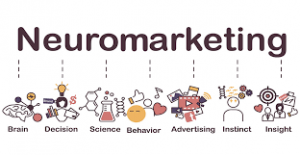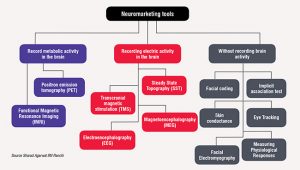What if there was a way for marketers to study the brain’s responses to advertising and branding in order to adjust the messages they feed to the public and ensure audiences are buying? Does this sound unethical or invasive to you? Now what if I told you that this revolutionary field of marketing already exists? Neuromarketing uses medical technologies like functional Magnetic Resonance Imaging (MRI’s) to gauge what the brand’s response is to certain stimuli. Researchers are able to use MRI results to understand activity changes in a person’s brain when they are exposed to marketing messages and learn why consumers make certain purchasing decisions. In addition, marketers can even learn what part of the brain encourages consumers to make these decisions.
 While many marketers would argue that neuromarketing us a helpful field that can assist with the information needed to better create services and products that consumers are more interested in purchasing, many people would argue that it is an unethical practice. Neuromarketing falls under subliminal advertising, which has long had the reputation of manipulating the consumer’s mind. According to an article by Neuroscience Marketing, “Neuromarketing will tell the marketer what the consumer reacts to, whether it was the color of the packaging, the sound the box makes when shaken, or the idea that they will have something their consumers do not.” The problem with neuromarketing is that it can give marketers a scientifically proven basis to determine the power of certain advertisements and how to tap into the consumer’s subconscious in a way that the consumer isn’t even aware about. Although this practice is helpful for businesses because it gives consumer behavior insights, it can be a manipulative tactic for the consumer.
While many marketers would argue that neuromarketing us a helpful field that can assist with the information needed to better create services and products that consumers are more interested in purchasing, many people would argue that it is an unethical practice. Neuromarketing falls under subliminal advertising, which has long had the reputation of manipulating the consumer’s mind. According to an article by Neuroscience Marketing, “Neuromarketing will tell the marketer what the consumer reacts to, whether it was the color of the packaging, the sound the box makes when shaken, or the idea that they will have something their consumers do not.” The problem with neuromarketing is that it can give marketers a scientifically proven basis to determine the power of certain advertisements and how to tap into the consumer’s subconscious in a way that the consumer isn’t even aware about. Although this practice is helpful for businesses because it gives consumer behavior insights, it can be a manipulative tactic for the consumer.
 Neuroscience Marketing also goes on to mention that “One of the challenges is that in some respects, ALL marketing is neuromarketing since marketing campaigns are almost always trying to produce some kind of brain activity that will lead to a desired behavior (e.g., buying a product).” This may worry consumers as they could potentially start to ask themselves if marketers will be able to find the sweet spot in their brain that when activated will tempt them to purchase a product. According to Neurofield, “In the end, science and technology will get to a level where they will play a huge role in our lives. They are already doing this: Facebook is violating our privacy by selling our information to other companies, and Google knows where you are 24/7.”
Neuroscience Marketing also goes on to mention that “One of the challenges is that in some respects, ALL marketing is neuromarketing since marketing campaigns are almost always trying to produce some kind of brain activity that will lead to a desired behavior (e.g., buying a product).” This may worry consumers as they could potentially start to ask themselves if marketers will be able to find the sweet spot in their brain that when activated will tempt them to purchase a product. According to Neurofield, “In the end, science and technology will get to a level where they will play a huge role in our lives. They are already doing this: Facebook is violating our privacy by selling our information to other companies, and Google knows where you are 24/7.”
 While there are certainly a variety of ethical and unethical cases in which neuromarketing has been utilized, such as health campaigns, political campaigns, and for charity organizations, it is important for companies to maintain their reputation by instilling trust in their consumers. Consumers do not want to feel threatened or like their privacy has been violated. However, when a company has built trust in the mind of the consumer, it becomes easier for them to use neuromarketing. In the end, the field of neuromarketing is not necessarily what is unethical, but what companies decide to do with the information provided can be. Neuromarketing has both advantages and disadvantages, and it’s important for marketers to use this field of marketing responsibly and for consumers to be aware of the practice.
While there are certainly a variety of ethical and unethical cases in which neuromarketing has been utilized, such as health campaigns, political campaigns, and for charity organizations, it is important for companies to maintain their reputation by instilling trust in their consumers. Consumers do not want to feel threatened or like their privacy has been violated. However, when a company has built trust in the mind of the consumer, it becomes easier for them to use neuromarketing. In the end, the field of neuromarketing is not necessarily what is unethical, but what companies decide to do with the information provided can be. Neuromarketing has both advantages and disadvantages, and it’s important for marketers to use this field of marketing responsibly and for consumers to be aware of the practice.